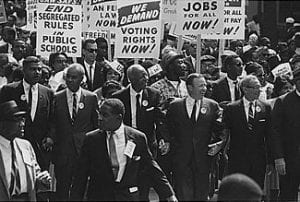The 2016 US presidential election: a post-mortem
By Melissa Bradshaw, on 23 November 2016
Dr Nick Witham began by admitting that he’d had to rewrite this Lunch Hour Lecture because, like all the pollsters, he had expected a different outcome from the US presidential election. Nonetheless, and unsurprisingly given Dr Witham’s expertise, it was a thorough post-mortem with important conclusions.
Although the electoral map of the US, as Dr Witham showed us, is now heavily dominated by Republican red, for only the fifth time in US history the President-elect lost the popular vote. Hillary Clinton has won more than 1.5 million more votes than Donald Trump, he said, and this margin could increase to 2 million.*
As well as the distorting effects of the Electoral College, Donald Trump’s victory “forces us to reckon with some very unpleasant features of the US political landscape,” Dr Witham said.
Trump’s appeal to ethno-nationalism, racism, and misogyny
He began by analysing the appeal of Trump’s campaign. His slogan, “Make America great again”, resonated with a large portion of the American population who felt unrepresented by globalisation, multiculturalism and political correctness: in particular in America’s Rust Belt, which has experienced stagnating wages and living standards.
“Make America great again” was also an etho-nationalist appeal to the memory of white privilege.

In many of the most memorable moments of his campaign – smearing immigrants, promising to build a “glorious” wall to keep out Mexicans, promising a ban on Muslims entering the US, and a public fight with the parents of a Pakistani-American US Army captain killed in Iraq – Trump “politicised immigration more successfully than any Republican candidate before him,” said Dr Witham. (Image: Evan Guest)
Trump also appealed to old-fashioned American racism, Dr Witham said, and he warned that Trump’s endorsement by white supremacists such as David Duke, former Imperial Wizard of the Ku Klux Klan, means that these people will now take a place at the forefront of American political life.
Finally Trump’s misogyny, culminating in a number of sexual assault allegations against him, and his behaviour towards Clinton in the televised debates, which was “dripping with condescension and privilege” only added to Trump’s status as a maverick outsider who “tells it like it is”. (T shirts worn at Trump rallies included “Hillary sucks but not like Monica” and “Trump that Bitch”.)
Unlike “shy Brexit” voters in the UK, Trump’s supporters did not quietly or shyly support him, but loudly and proudly.
Clinton’s weaknesses, and factors working against her
Dr Witham also gave a full analysis of Clinton’s weaknesses. Her campaign was based on a continuation of the Obama administration and her insider status gave her opponent the perfect opportunity to brand her as “crooked”.

Within the Democratic party, Bernie Sanders’ campaign, based on small donations from ordinary Americans, rather than from the big donors who supported Clinton, highlighted her weaknesses.
Dr Witham was “doubtful” Bernie could have beaten Trump, as Sanders’ socialism would have made him a target for red-baiting from the media and “would have crippled him”.
By focusing their campaign on character and fitness for office, Clinton’s own campaign also prevented her from discussing her mastery of policy issues and her deep experience as a politician and diplomat, he added.
Last, but not least, in the factors working against Clinton was the last minute intervention of FBI Director James Comey, in which he announced a new investigation into the candidate’s emails.
Clinton’s weaknesses were thus not entirely of her own making, Dr Witham said: she was “an establishment figure in an inhospitable political climate”. But it is difficult not to conclude that she was a “deeply flawed candidate”.
Troubling signs: voter suppression, authoritarianism
Dr Witham’s conclusions about the troubling aspects and outcomes of this election are especially worth noting.
There was a deliberate campaign by Republican politicians to make it harder to vote, as well as other voter suppression campaigns by Trump supporters. For the first time since the Voting Rights Act of 1965 had guaranteed the right of African Americans to vote, America has begun to return to the dark days of minority disenfranchisement. And in swing states African American voter turnout was down.

At the same time, Trump’s campaign was able to garner support from all of the white vote, with the exception of college educated women.
It is impossible to know how the Republicans will work with Trump, said Dr Witham, but his priorities will likely include some repeal of Obamacare, the mass deportation of illegal immigrants and the appointment of an anti-abortion, anti-gun control Supreme Court Justice to replace Antonin Scalia. (Image: the March on Washington for Jobs and Freedom, 1963)
Trump will also be in a strong position to repeal the gradual closure of Guantanamo Bay, America’s commitment to the Paris climate agreement and rules allowing transgender students in schools and colleges to decide for themselves which bathrooms to use.
Finally, Dr Witham emphasised that the authoritarian nature of Trump’s campaign – his threats to jail Clinton, his insistence that the elections are rigged, and his disregard for fact – proves his contempt of the conventions of democracy.
The appointment of Steve Bannon as Trump’s Chief Strategist, suggests that Trump will remain committed to this authoritarianism.
Our response in the UK, Dr Witham said, must be to refuse the normalisation of Trump, and to continue to call out his bigoted outcries and authoritarian rule for what they are.
*Clinton’s lead in the popular vote has now surpassed 2 million
 Close
Close

